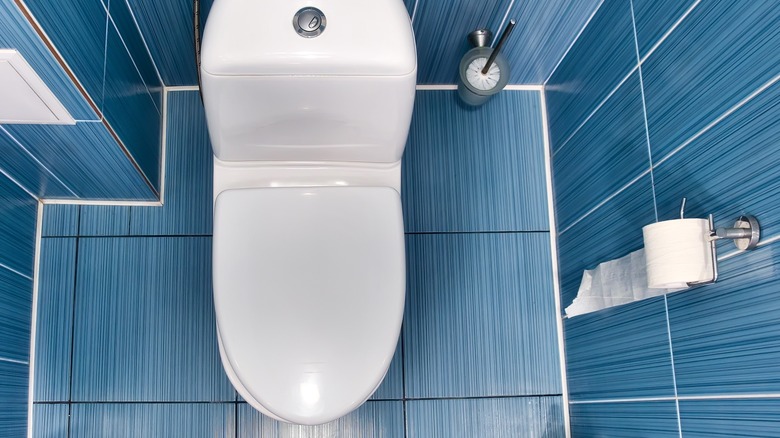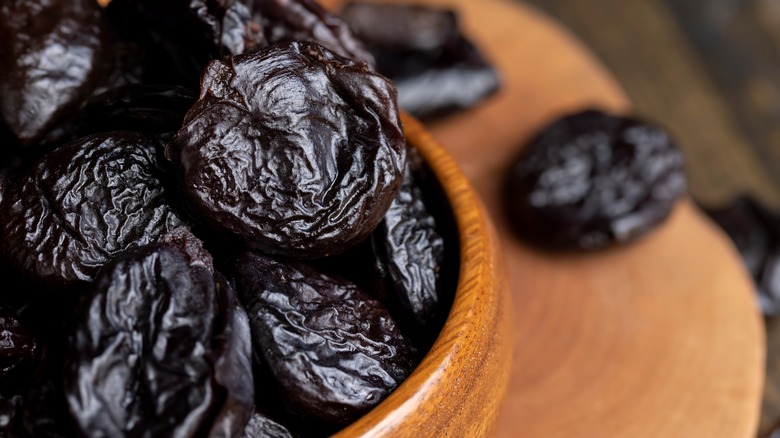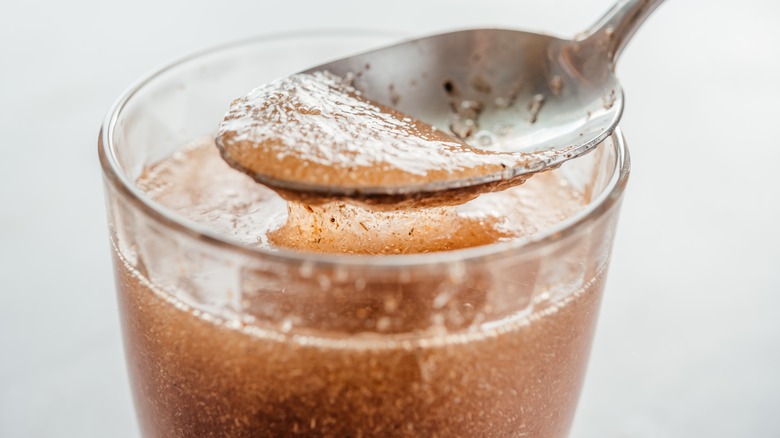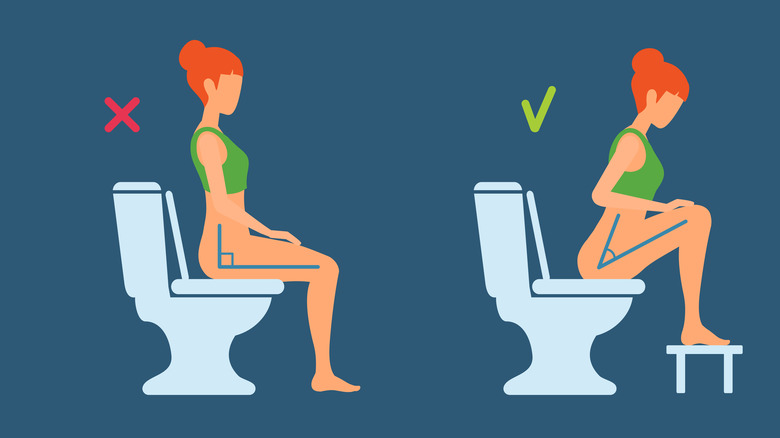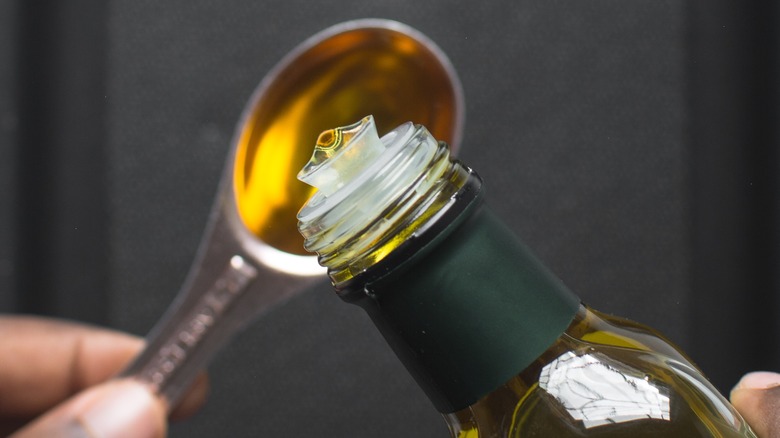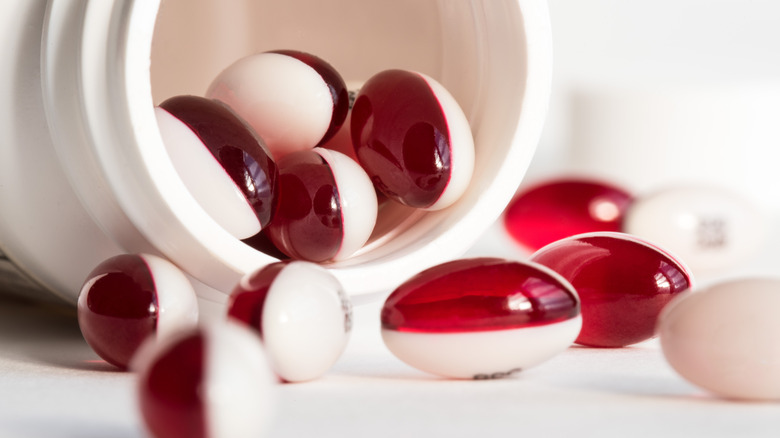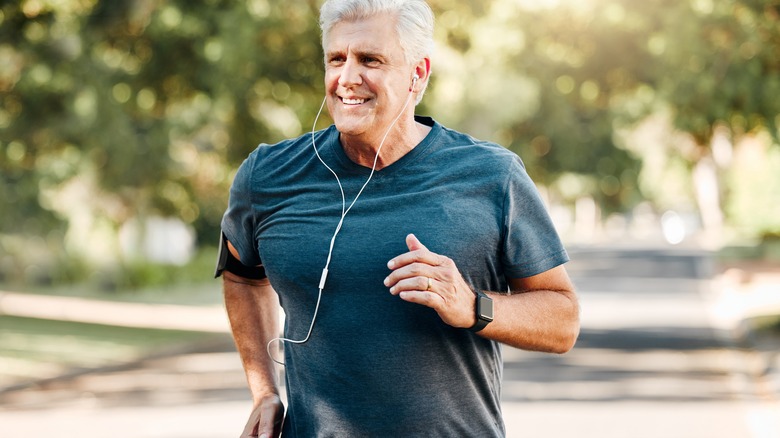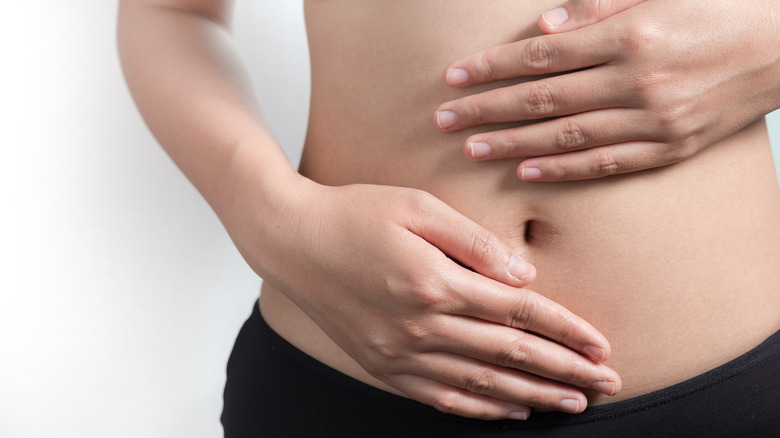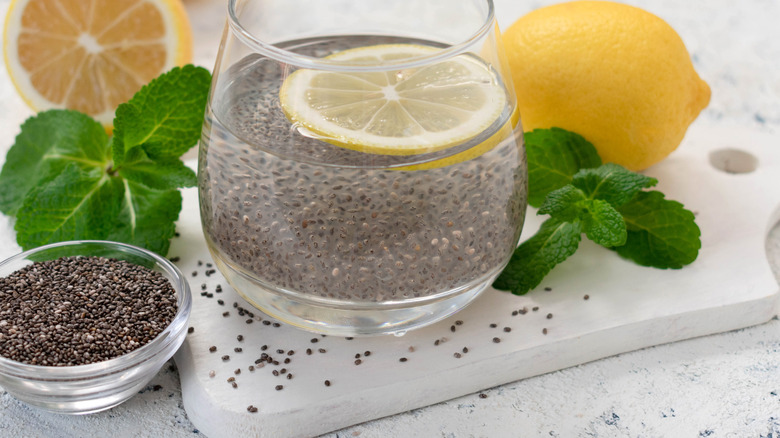Genius Ways To Get Yourself To Poop Instantly
You don't have to poop every day to be considered regular. But if your pooping is strained or you feel stuck, it is likely you are constipated. And we all know how awful that may feel.
Everyone is different, but pooping anywhere from 3 times per day to 3 times a week can fit within a normal degree of regularity, gastroenterologist Dr. Madathupalayam Madhankumar told Livestrong. The important thing is that it releases without strain and should provide a sense of relief, he explained.
Even those who consume a healthy diet and exercise regularly may be impacted. Why? Hormonal fluctuations due to perimenopause or stress can impact the gut (via A Gutsy Menopause). Likewise, alterations of gut microbiota can affect the way we poop. Hence, imbalances in your gut colony may contribute to functional constipation, according to a 2019 review in Frontiers in Medicine.
To treat that occasional constipation, there are some genius ways to get you to poop instantly. (And yes, coffee is on the list.)
Enjoy a cup of coffee
If you love your morning coffee, we have some good news. Aside from its bold taste and rev-you-up effect, it can also jump-start the bowels to provide some rectal relief.
The caffeine in your cup of Joe stimulates muscle contractions in your stomach and large intestine to get those bowels moving, according to the Cleveland Clinic. It does so by releasing gastrin, a hormone that triggers peristaltic movement in those organs. What's more, it may also release a key hormone, cholecystokinin, which is essential for digestion. And if you add dairy creamer or milk to your coffee, it may add to the laxative effect. In fact, the lactose, sugars, and fat in your splash or two of dairy may help speed intestinal transit time as well.
Okay, so what if you prefer decaf? The acidity in your coffee will also get things moving, just not as fast, as gastroenterologist Christine Lee explained to the Cleveland Clinic. Long story short, coffee — whether it is regular or decaf — has a laxative effect.
Have a cup of herbal tea
If tea is your preferred beverage, going for something herbal may also be an effective way to get you pooping. In fact, herbal laxatives work by stimulating intestinal transit and drawing water to the colon for effective bulking and softening of the stool, per NHS Inform.
What ingredients should you look for to provide quick relief? Senna, peppermint, dandelion, licorice, marshmallow root, chamomile, and ginger are among medicinal herbs and roots that may help relieve mild constipation, according to Medical News Today.
Senna contains glycosides that stimulate digestion and have laxative effects. Peppermint has a relaxing effect, which may also help stimulate the transit of stools. Though it has traditional usage as a diuretic, dandelion root may help ease the passing of poop by drawing more water to the digestive tract and stool. With an anti-inflammatory and soothing effect, licorice root may also help get your stool moving. Marshmallow, a natural laxative, has soothing effects as well. Chamomile is calming to the digestive system, which can help keep your bowels running smoothly. And lastly, ginger root has influence on the digestive enzymes trypsin and pancreatic lipase, which aid in speeding digestive motility and stomach emptying, via Gutivate.
Eat prunes
There's a particular fruity snack that can help you get moving, so to speak: You can rely on dried plums (aka prunes) to help stimulate a quicker bowel movement.
Reach for some prunes if you are feeling a bit stuck. Not only do they have plenty of dietary fiber, but they also contain a sugar alcohol called sorbitol, which has a laxative effect. So, while fiber (and plenty of water) is deemed essential for maintaining regularity, it's the sorbitol in those prunes that may help you poop instantly.
If you want to maximize the bowel-boosting benefits of prunes, try soaking them overnight, or opt for 100% prune juice, says gastroenterologist Dr. Ashkan Farhadi (via Prevention). Either option makes it easier for you to consume prunes than just eating the regular dried variety. Furthermore, soaking allows for speedier digestion and better absorption of nutrients (via NetMeds). Even just 2 to 3 hours of soak time can be beneficial.
Consider a fiber supplement
Just a couple of tablespoons of psyllium husk dissolved in water may provide immediate relief. In fact, according to a 2019 study published in the International Journal of Molecular Sciences, psyllium husk may do more than simply trap water in the colon to soften the stool; it may also have a positive effect on the gut's microbiota.
The researchers examined the effects of psyllium on both healthy and constipated individuals. They found that the fiber supplement improved gut microbiota as well as bowel activity in all individuals, though more notably in those with constipation issues. Ingestion of psyllium was linked to specific increases in certain microbes, including Lachnospira, Roseburia, and Faecalibacterium (all known to produce butyrate, which benefits the gut). The increases in these microbes were also linked to increasing water in the stool, which stimulates the passing of more solid, softened, and easier-to-pass bowels.
While psyllium tops the list in stool-bulking effectiveness for quick bowel relief, you may also reach for other fiber supplements, including wheat brain, inulin, and pectin.
Do some yoga (twisting)
Yoga has many benefits, including improving balance, strength, and coordination. And because certain stretches may stimulate the digestive organs, there are yoga poses that can alleviate constipation.
Whether you are seated, standing, or lying down, a spinal twist can massage the abdominal organs to get your food moving along the digestive tract. Now, you wouldn't want to put pressure on the abdomen immediately after eating, especially if you have GERD, as it can cause gastric discomfort. But if an hour or two has passed, you can certainly do some gentle twisting to aid the digestive process.
But is there a proper way to twist to get the most of the digestive benefit? You should start by twisting to the right, says Helgrid Randolf, a Denver-based Ayurvedic practitioner and yoga teacher (via Yoga Journal). Twisting to the right expands the ascending colon to move your food up and across your transverse colon. When you follow up with a left twist, it gets your food moving down into the sigmoid colon, from where you pass your stool. This action basically pushes the food along the proper path until it's out of your body.
Squat on the porcelain throne
Feeling the urge, but a little backed up? Don't hold that poop for too long. Gravity and leverage can be just what you need to get those bowels moving. Thus, squatting can be your remedy for a quicker release.
To be clear, we are talking about squatting on the toilet. Studies show that a "squatty potty" position can help you poop instantly, per WebMD. This is because keeping your knees above your hips relaxes the muscles in your rectal region, allowing the colon to temporarily straighten from its naturally tilted position (which is necessary for holding it in until you are ready to go). This essentially gives your poop a direct route out.
Here's how to do it properly, according to the Government of Western Australia's Department of Health: Grab a foot stool and place it in front of the toilet. Here, you will rest your feet while seated so that your knees are higher than your hips. Keep your back straight and lean forward. Rest your forearms on your knees. Inhale to expand your waist to put a little pressure on your colon; this will help move your stool to its exiting position. Then, exhale and release. Repeat as needed.
Consume a tablespoon of olive oil
Conventional wisdom tells us that a spoonful of sugar helps the medicine go down. Interestingly, a tablespoon of oil may get those tight bowels moving. The science behind this is partly based on lubrication, but oil can also promote a softer stool. According to Medical News Today, the fats in edible oils smooth the bowel linings and keep more water in the stool. Mineral oil in particular reduces the absorption of water in the colon; thus, more water is redirected to the stool, per WebRx. The only issue is that it may cause some cramping, so don't go overboard.
A 2015 study in the Journal of Renal Nutrition involving 50 dialysis patients found that consuming just 4 milliliters of olive or flaxseed oil daily was just as effective as mineral oil in relieving constipation. The good news is that you probably have some olive oil in your cupboard.
A small amount is key, and timing can also make a difference. So, consider taking a tablespoon of olive oil in the morning on an empty stomach. While you can eliminate at any time of day, the morning may offer better results. That's because "there's evidence that there's more colonic contraction in your first hour of wakefulness," Dr. David M. Poppers, a gasteroenterologist, told HumNutrition.
Take a magnesium supplement (but be sure you have the right one)
Magnesium can be just as good for the stomach as it is for the heart, your muscles, and your bones (via Mindd Foundation). In fact, the mineral helps stimulate peristalsis movement in the digestive tract to move your food along and help you pass a healthy stool.
When it comes to upping your magnesium intake, you can reach for whole foods such as nuts, seeds, and legumes. These foods are high in both fiber and magnesium, which is doubly beneficial for your bowels. But if you need to get a more speedy release, you may want to consider a magnesium citrate supplement. It not only relaxes your bowel muscles, but also draws water to soften the stool to get the job done. As a saline laxative, it may provide relief within 30 minutes, according to WebMD. Drink an 8-ounce glass of water after taking the supplement, and stick to the dosage on the label — too much can have the opposite effect and lead to diarrhea.
Don't just buy any magnesium supplement, though; be sure to read the labels. While magnesium hydroxide also has laxative properties, it's better suited for heartburn relief. Meanwhile, magnesium glycinate may help reduce stress and promote better sleep. There are several other types of magnesium supplements available on the market, but magnesium citrate is the one to reach for when you are acutely constipated.
Consider a stool softener
If you have mild constipation, you may reach for a stool softener to do just that — soften your stool. It works as an emollient laxative by bringing liquid into your stool to keep it moist and prevent a hard, dry stool from forming, according to the Cleveland Clinic. Thus, they allow you to pass a poop without strain. Unlike osmotic or stimulant laxatives, it does not stimulate any movement in the intestine. The active ingredient in a stool softener is either docusate sodium or docusate calcium.
There are different types of stool softeners. One type you take by mouth in the form of a pill or capsule. Like most oral medications, it's best to take it with a full (8-ounce) glass of water. The other type is a waxy-like insert you apply to your rectum that will melt and dissolve naturally due toyour body temperature. The best time to take one is at bedtime. So, by the time you wake up, you'll poop without strain. And be sure to stay hydrated with plenty of water throughout the day, exercise, and eat fiber-rich foods.
Jog or run for relief
For those of us who aren't runners, it may be surprising to learn that running can bring on more than just the urge to poop; it may actually get you going. So, if you are slightly constipated, consider going for a run (or at least a power walk).
Jogging or running will speed your gastric motility, which can increase your likelihood to poop, according to Dr. Devin RH Smith (via Unity Point Health). This is why runners evacuate before their run and avoid foods that may trigger or stimulate a bowel movement up to 6 hours before. Such triggers include fats, sweeteners, dairy, legumes, caffeine, and NSAIDS.
The bottom line: Get moving. While it is always best to stay well hydrated, exercise, and eat plenty of fiber-rich whole foods for regularity, you may sometimes experience stress- or hormonally-triggered constipation. If you need some quick relief but don't want to take anything orally, go for a fast walk, jog, or run.
Give your belly some love
You can take care of your body by eating nutrient-dense foods, exercising consistently, and drinking plenty of water. You can also show it some love with a gentle massage. And it may be especially in need of some loving affection if you are feeling constipated. Indeed, a good belly rub may provide some relief, according to Greater Boston Urology.
A constipation belly massage involves tracing the initials for "I love you" (ILU). Start at the left of your belly and use consistent, gentle pressure to "draw" a straight line from just below your ribs to the top of your hip (an "I"). Repeat this 10 times. Then, starting from right to left, add the same gentle pressure along the top of your bellow (below your ribcage) and repeat the "I" movement that moves from your left rib to your left hip. Repeat this "L" shape 10 times. Lastly, create your "U" by starting at your right hip and drawing an upward line stroke, continuing across the belly, and completing the downward I along the left side.
Eat some chia seeds (but be sure to soak them first)
In the 1980s, chia seeds became known as a decorative novelty: If you were a '70s or '80s child, you may have been fond of chia pets. It wasn't until a decade later that the seeds (the ones deemed fit for consumption) were recognized in the United States as a "superfood." These days, you can get an extra boost of nutrition by enjoying those tiny black seeds in chia puddings, your oatmeal, cookies, salads, and cereals.
What do chia seeds have to offer? Plenty! Chia seeds are an impressive source of gut-healthy omega-3s, protein, and dietary fiber. While all these are beneficial to the gut, it's that fiber in chia, known as mucilage, that can have constipation-relieving effects. Soaked chia seeds can have a laxative effect, according to GI researcher and clinical dietitian Bethany Doerfler, MS, RDN (per VeryWell Health). That's because mucilage has a tremendous capacity to hold a lot of water. Fun fact: Chia seeds can absorb 12 to 15 times their weight in water.
So, if you need quick relief, enjoy some chia pudding or add some soaked chia to your oatmeal or smoothie. The gel-like consistency of soaked chia may add bulk to your stool and help it pass more easily, according to a 2023 review in Food Science & Nutrition.
When to see a doctor
Everyone gets constipated from time to time. In fact, 30% of older adults have occasional constipation, according to the National Institute on Aging (NIA). Pressures at work or home can lead to stress that can impact your gut health. Inadequate sleep, poor nutrition, and limited exercise can also be factors (via UCSF Health). Hormonal fluctuations that come with aging can play a part as well (via A Gutsy Menopause).
Constipation is generally not a cause for concern, per the NIA. If it is occasional and responds to treatment strategies, you should be okay. However, in certain cases, it can be a sign of a deeper medical problem. Diseases that may contribute to constipation include diabetes, irritable bowel syndrome, Parkinson's, tumors, blockages, and certain cancers. Certain medications can be linked to constipation as well.
Chronic constipation that develops after years of regularity may also be of concern, according to gastroenterologist Christopher Almario (per Cedars Sinai). If constipation is accompanied by unintended weight loss, blood in the stool, abdominal pain, excessive strain, fever, or lower back pain, you should seek immediate medical attention.

